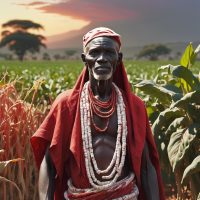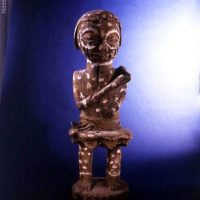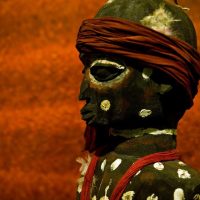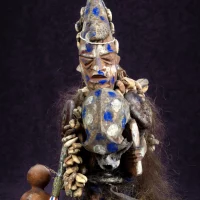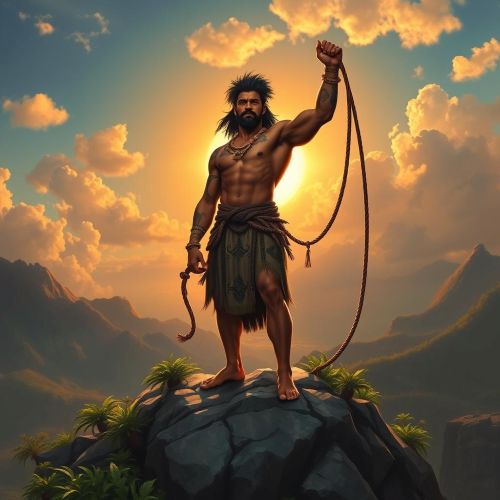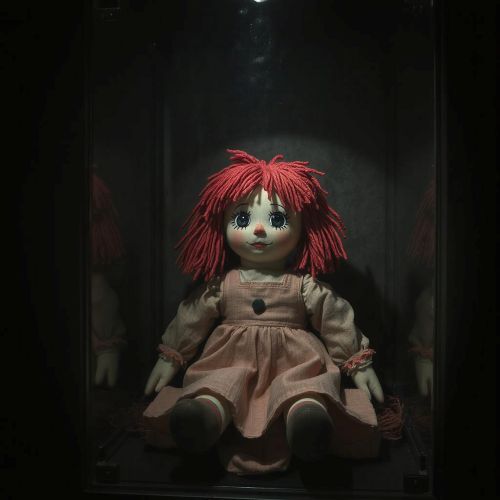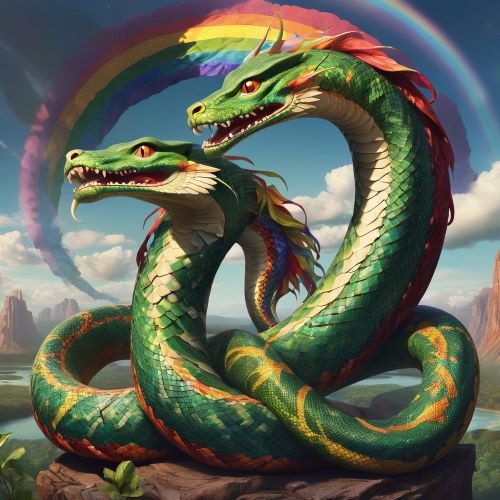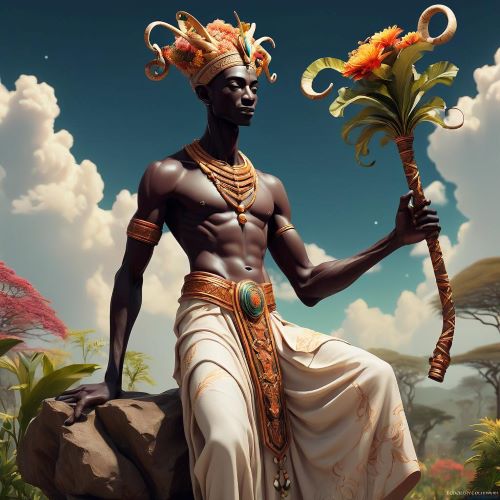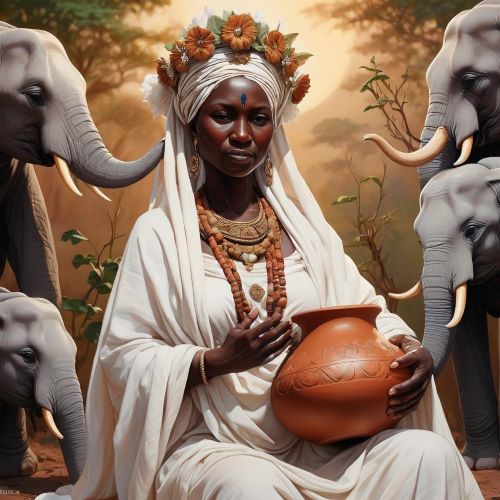Sakpata : God of the Earth
Listen
At a glance
| Description | |
|---|---|
| Origin | Fon Mythology |
| Classification | Gods |
| Family Members | Mawu Lisa (Mother) |
| Region | Benin, Togo |
| Associated With | Small Pox, Earth |
Sakpata
Introduction
Sakpata, also referred to as Sagbata, holds a significant place within the Fon religion of West Africa, where he is revered as both the god of the earth and smallpox. In Fon mythology, the name “Sakpata” not only represents the deity himself but also encompasses the entire pantheon of earth gods. The Fon people, residing primarily in Benin and Togo, boast a diverse array of divine beings, each with its own narrative and importance. However, Sakpata stands out among them, recognized for his dominion over illness and healing, as well as his role as a guardian of society.
Physical Traits
Sakpata’s appearance is often portrayed with ambiguity, depicting an aged, hobbled figure associated with the infliction of smallpox and madness. While specific physical traits are not extensively documented, various representations symbolize his dominion over disease and ailments. Many depictions illustrate Sakpata adorned with sores and lesions, evoking a portrayal of resilience despite affliction. Additionally, he is sometimes depicted wielding a staff or wand, symbolizing his authority over life and death.
Though visual depictions of Sakpata are rare, some accounts describe him as an elderly figure cloaked in red and white beads, colors symbolizing the earth and smallpox respectively, emphasizing the dual nature inherent in his being. Other interpretations present Sakpata as androgynous, reflecting the earth’s nurturing essence encompassing both masculine and feminine energies.
Family
Sakpata’s lineage varies across different Fon traditions, reflecting the complexity of his divine origins. According to one widely accepted account, he is believed to be the firstborn son of Mawu-Lisa, the supreme creator god. In this narrative, when Mawu-Lisa partitioned the realms of the world, Sakpata inherited dominion over the earth.
Alternatively, another tradition presents a different lineage for Sakpata. Here, he is depicted as the eldest son of Da Zodji and Nyohwè Ananu, twin deities who themselves were the firstborn offspring of Mawu-Lisa. According to this version, Sakpata is part of a larger earth pantheon, with his siblings embodying various aspects of the earth’s power. Together, these siblings, known collectively as the “Sakpata gods,” highlight the diverse and multifaceted nature of the earth deity’s lineage.
Within the pantheon of Fon deities, Sakpata’s familial associations extend to other significant figures such as Mawu-Lisa, the divine creator, and Gbadu, the earth goddess. These connections underscore Sakpata’s integral role in maintaining cosmic order, bridging the realms of the heavens and the earth. Through his interactions with other gods and goddesses, Sakpata’s influence shapes the destiny of both mortals and immortals within Fon mythology.
Other names
Across the diverse regions where Fon culture flourishes, Sakpata is recognized by various names, showcasing the interconnectedness of African spiritual beliefs and the adaptability of divine identities across different cultural contexts. In neighboring Yoruba mythology, he is venerated as Babalu-Aye, sharing striking similarities in attributes and significance with his Fon counterpart. Moreover, Sakpata is known by several other names in different religious traditions. In the Yoruba religion, he is referred to as Ṣọ̀pọ̀na or Shapona, while in the Afro-Brazilian tradition of Candomblé, he is identified as Sakpata or Sakpata-Omolu. Notably, the name “Sapona” is regarded as taboo, underscoring the deity’s potency as the Lord of Infectious Disease. As a result, various alternative names and titles, such as Omolu, have been utilized to invoke the deity since ancient times.
The name “Sakpata” itself carries profound significance, embodying a dual meaning. Literally translating to “earth” in the Fon language, it solidifies his connection to the nurturing and life-sustaining soil. However, “Sakpata” also serves as a broader term encompassing the entire pantheon of earth gods, blurring the distinction between the individual deity and the overarching concept he represents.
Additional names associated with Sakpata often emphasize his connection to smallpox. Terms like “Nan” or “Da Nan,” meaning “the eater” or “the devourer,” directly allude to the relentless nature of the disease. Similarly, titles such as “Kpavi” (meaning “red”) reference the characteristic rashes associated with smallpox. These alternative names underscore the reverence and trepidation with which people regard this potent and potentially lethal deity.
Powers and Abilities
Sakpata’s divine authority spans two realms: the earth and the affliction of smallpox. Revered as the steward of fertility, he ensures the fecundity of the land, blessing it with abundant harvests and sustaining life. Yet, alongside this benevolent aspect, Sakpata wields the power to unleash devastating epidemics, notably smallpox, which has historically ravaged West Africa.
This duality extends to his role as a healer. While capable of inflicting sickness, Sakpata is also venerated as a protector against it. Communities revered him as the arbiter who could both initiate and mitigate outbreaks of smallpox. In times of epidemic distress, fervent prayers and offerings were directed to him, beseeching his intervention to ward off illness or find solace amidst calamity.
Legend intertwines Sakpata’s dominion over smallpox with his control over the earth itself. In a mythical tale, Sakpata and his brother Sogbo clashed over the earth’s sovereignty. Moving to stake his claim, Sakpata found himself unable to command the rains, resulting in a devastating drought. Through the intervention of the messenger god Legba and the bird Wututu, reconciliation was achieved, with Sogbo now aiding his brother in safeguarding the earth from drought.
The worship of Sakpata centers on appeasing his divine will and securing his benevolence. Elaborate rituals are enacted to placate him, often involving specific offerings such as red and white beaded garments, reflective of his symbolic colors, as well as designated foods and animal sacrifices. Central to these ceremonies are songs and prayers, serving as heartfelt appeals for protection from smallpox and expressions of gratitude for health and agricultural abundance. Throughout Fon communities, dedicated shrines to Sakpata stand as focal points for worship and supplication, embodying the enduring reverence for this enigmatic deity.
Modern Day Influence
The worship of Sakpata endures in a transformed guise, shaped by modern advancements. With the eradication of smallpox through vaccines, the focal point of his reverence has shifted. No longer solely centered on pacifying his wrath and averting smallpox, worship now celebrates his identity as an earth deity synonymous with fertility and abundance.
Nevertheless, the specter of smallpox and its profound impact lingers in collective memory. Sakpata remains a poignant emblem of the delicate equilibrium between life and death, health and affliction. His enduring legacy lies in his embodiment of the earth’s dual nature, both nurturing and destructive.
Moreover, Sakpata’s influence transcends the realm of traditional worship, permeating broader religious practices in West Africa. His association with healing and safeguarding continues to inspire contemporary religious leaders and indigenous healers alike. The concept of a deity embodying both benevolent and malevolent forces echoes throughout diverse West African belief systems.
In modern times, Sakpata’s influence persists, particularly evident in the indigenous African religion of Vodún and its resonance among black communities across the Americas. Among the Fon people of Benin and Togo, Sakpata remains one of the most venerated deities. In Dahomean religion, he embodies the essence of the earth, wellness, and smallpox, wielding the power to bestow both sanity and affliction upon humanity. Additionally, his impact manifests in traditional dance forms in Togo.
Rooted in ancient mythology, the legacy of Sakpata continues to reverberate across geographical and cultural boundaries. Rituals and ceremonies dedicated to Sakpata persist in communities throughout Africa and the diaspora, offering solace and supplication to those in need. Furthermore, Sakpata’s symbolism permeates contemporary art, literature, and music, serving as a wellspring of inspiration for creative expression and cultural resurgence.
Related Images
Frequently Asked Questions
What is lorem Ipsum?
I am text block. Click edit button to change this text. Lorem ipsum dolor sit amet, consectetur adipiscing elit. Ut elit tellus, luctus nec ullamcorper mattis, pulvinar dapibus leo.
What is lorem Ipsum?
I am text block. Click edit button to change this text. Lorem ipsum dolor sit amet, consectetur adipiscing elit. Ut elit tellus, luctus nec ullamcorper mattis, pulvinar dapibus leo.
What is lorem Ipsum?
I am text block. Click edit button to change this text. Lorem ipsum dolor sit amet, consectetur adipiscing elit. Ut elit tellus, luctus nec ullamcorper mattis, pulvinar dapibus leo.
What is lorem Ipsum?
I am text block. Click edit button to change this text. Lorem ipsum dolor sit amet, consectetur adipiscing elit. Ut elit tellus, luctus nec ullamcorper mattis, pulvinar dapibus leo.
What is lorem Ipsum?
I am text block. Click edit button to change this text. Lorem ipsum dolor sit amet, consectetur adipiscing elit. Ut elit tellus, luctus nec ullamcorper mattis, pulvinar dapibus leo.

